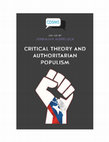Papers (articles and chapters) by Felipe Ziotti Narita

Palgrave Macmillan, 2023
Beginning in the 1980s, market pressures informed a redefinition of state responsibilities regard... more Beginning in the 1980s, market pressures informed a redefinition of state responsibilities regarding welfare policies and social justice. In this context, public policy became a mainstream political tool to safeguard a minimum of welfare policy. Especially in Latin America, which underwent structural market and state reforms in the wake of the fiscal crises of the 1980s, this process has been palpable in educational systems. The pressures of oligopolies and the expanded presence of private actors in public schooling, from elementary school to higher education, point not only to the incorporation of private management strategies into the public domain and the need for adaptation to how capitalism is reengineering learning environments, but also to the weakness of the public. As state and public responsibilities are transferred to private actors, education becomes a matter of training and profitability, its function narrowed to the development of “human capital” and the reproduction of the labor force. This chapter builds from Marxist and decolonial perspectives to critique human capital theories (especially Gary Becker) in light of the geopolitics of knowledge, and to argue the need for public policy to reverse the structural social asymmetries and class cleavages in peripheral societies of Latin America. Public policy in education, as a counterpart of redistributive policy, can be conceived as a prospect of social development and emancipation committed to the quest for dignity and the denunciations of the contradictions of the discourse of citizenship in liberal democracies.

Critical Sociology, 2022
In this article, we analyze the role of conspiracy theories, especially the spread of QAnon durin... more In this article, we analyze the role of conspiracy theories, especially the spread of QAnon during the COVID-19 pandemics, in the legitimation crisis and epistemic crisis in contemporary democracies. We discuss Habermas' theory of legitimation crisis and the potential for reactionary movements in times of such crisis, as well as Hofstadter's description of the paranoid style in political culture. We explain the notion of 'epistemic crisis' as theorized by Larry Laudan and discussed recently in relation to social media. We discuss anti-intellectualism in Hofstadter's terms, and explain its connection with populism. Finally, we explain how all of this comes to bear on the contemporary proliferation of conspiracy theory, using QAnon and the COVID crisis as our point of reference, and examples from the United States and Brazil to illustrate our points. QAnon fueled COVID-19 conspiracy theories, and COVID-19 conspiracy theories rocketed QAnon to a place of major influence.
In: Morelock, Jeremiah. How to Critique Authoritarian Populism. Leiden: Brill, 2021. (Studies in ... more In: Morelock, Jeremiah. How to Critique Authoritarian Populism. Leiden: Brill, 2021. (Studies in Critical Social Sciences Series, dir. David Fasenfest)

Journal of Psychosocial Studies, 2024
Fromm’s theories can help the Left overcome its collective rejection of individualism and univers... more Fromm’s theories can help the Left overcome its collective rejection of individualism and universalism, which limit socio-political possibility, offering Left solutions to these challenges and promoting alternate perspectives. His humanistic vision shares much with humanistic and positive psychology but differs in important respects. Centrally, Fromm’s notion of emancipation emphasises both individual and societal components. He believes independent and authentic relationships are a higher expression of human potential and bring true fulfilment. Fromm identifies a creative, non-alienated character orientation that includes a ‘humanistic conscience’. Comparing authoritarian and humanistic consciences, he emphasises human potential and social and individual interdependence. Personal development must also drive social change, and vice versa. Fromm’s perspective rejects zero-sum, either/or thinking about social change vis-à-vis individual flourishing. For him, both are important, and they are related. Following Fromm’s example, the Left should stress that individualistic societies cannot satisfy individual needs. Self-fulfilment requires fairness, community and shared personal experiences.
The Many Faces of Populism, 2025
In: Mlado Ivanovic, Dustin J. Byrd, and Jeremiah Morelock (ed.). The Many Faces of Populism. Leid... more In: Mlado Ivanovic, Dustin J. Byrd, and Jeremiah Morelock (ed.). The Many Faces of Populism. Leiden: Brill, 2025.
Journal of Contemporary Central and Eastern Europe, 2022
Universidade da Beira Interior, 2023
In: CORREIA, João Carlos (ed.). Pathologies and dysfunctions of democracy in the media context: e... more In: CORREIA, João Carlos (ed.). Pathologies and dysfunctions of democracy in the media context: emotions, populism, and polarization.
Cadernos CIMEAC, 2022
An interview with Zeus Leonardo organized and conducted by Felipe Ziotti Narita and Jeremiah More... more An interview with Zeus Leonardo organized and conducted by Felipe Ziotti Narita and Jeremiah Morelock.

Critical, Digital and Social Media Studies, 2018
FREE DOWNLOAD of the full book and individual chapters are available at: https://www.uwestminste... more FREE DOWNLOAD of the full book and individual chapters are available at: https://www.uwestminsterpress.co.uk/site/books/10.16997/book30/
After President Trump’s election, BREXIT and the widespread rise of far-Right political parties, much public discussion has intensely focused on populism and authoritarianism. In the middle of the twentieth century, members of the early Frankfurt School prolifically studied and theorized fascism and anti-Semitism in Germany and the United States. In this volume, leading European and American scholars apply insights from the early Frankfurt School to present-day authoritarian populism, including the Trump phenomenon and related developments across the globe. Chapters are arranged into three sections exploring different aspects of the topic: theories, historical foundations, and manifestations via social media. Contributions examine the vital political, psychological and anthropological theories of early Frankfurt School thinkers, and how their insights could be applied now amidst the insecurities and confusions of twenty-first century life. The many theorists considered include Adorno, Fromm, Löwenthal and Marcuse, alongside analysis of Austrian Facebook pages and Trump’s tweets and operatic media drama. This book is a major contribution towards deeper understanding of populism’s resurgence in the age of digital capitalism.
CONTENTS
Preface
Douglas Kellner
Introduction: The Frankfurt School and Authoritarian Populism – A Historical Outline
Jeremiah Morelock
Part 1: THEORIES OF AUTHORITARIANISM
1. Frankfurt School Critical Theory and the Persistence of Authoritarian Populism in the United States
John Abromeit
2. The Persistence of the Authoritarian Appeal: On Critical Theory as a Framework for Studying Populist Actors in European Democracies
Lars Rensmann
3. Understanding Right and Left Populism
Samir Gandesha
4. Donald Trump as Authoritarian Populist: A Frommian Analysis
Douglas Kellner
PART 2: FOUNDATIONS OF AUTHORITARIANISM
5. From Modernity to Bigotry
Stephen Eric Bronner
6. Opposing Authoritarian Populism: The Challenge and Necessity of a New World System
Charles Reitz
7. Public Sphere and World-System: Theorizing Populism at the Margins
Jeremiah Morelock and Felipe Ziotti Narita
Part 3: DIGITAL AUTHORITARIANISM
8. Racism, Nationalism and Right-Wing Extremism Online: The Austrian Presidential Election 2016 on Facebook
Christian Fuchs
9. Authoritarianism, Discourse and Social Media: Trump as the ‘American Agitator’
Panayota Gounari
10. Phantasmagoria and the Trump Opera
Forrest Muelrath
Commoning - ed. Anna Piekarska, Piotr Juskowiak, Jakub Krzeski, Krystian Szadkowski (Praktyka Teo... more Commoning - ed. Anna Piekarska, Piotr Juskowiak, Jakub Krzeski, Krystian Szadkowski (Praktyka Teoretyczna, 2020)

Critical Theory and Authoritarian Populism, 2018
FREE DOWNLOAD of this chapter is available AT: https://www.uwestminsterpress.co.uk/site/chapters... more FREE DOWNLOAD of this chapter is available AT: https://www.uwestminsterpress.co.uk/site/chapters/10.16997/book30.h/
Building from Jürgen Habermas and Immanuel Wallerstein, we develop a scheme in application to authoritarian populism in general, and specifically to populisms in the history of peripheral and semi-peripheral countries of Latin America in their world-systems context. Our discussion is divided into three main components: (1) a conceptual delimitation of populism and its authoritarian variations; (2) an outline of some of Habermas’ and Wallerstein’s theories as they pertain to populism; and (3) an attempt at bringing Habermas’ and Wallerstein’s theoretical models into conversation via an operational scheme dealing with world-systems analysis and the problem of the public sphere and lifeworld. Our main effort consists in bringing the rise of the twentieth century industrial world (urban life, urban masses, the press and so on) and the challenges of the public sphere together to understand the problem of populism in (semi)peripheral countries. Accelerated capitalist change produces major impacts on communicative structures, so that, more than a political issue confined to contemporary Western democracies, populism deals with the transnational developments of the modern world-system. At the margins, thus, populism and its authoritarian slips have strong roots in the context of global capitalist transformations of local lifeworlds.
Historiar: sobre conceitos e linguagens, 2024
In: NAXARA, M. R. C.; LEME, M. S.; CAMILOTTI, V. C. Historiar: sobre conceitos e linguagens. São ... more In: NAXARA, M. R. C.; LEME, M. S.; CAMILOTTI, V. C. Historiar: sobre conceitos e linguagens. São Paulo: Intermeios, 2024.
In: LYNCH, Christian Cyril; VIEIRA, Lidiane; CASSIMIRO, Paulo Henrique. Visões da independência n... more In: LYNCH, Christian Cyril; VIEIRA, Lidiane; CASSIMIRO, Paulo Henrique. Visões da independência no pensamento político brasileiro. Rio de Janeiro: Faperj, 7Letras, 2024.
In: FONSECA, S. C.; JESUS, C. G. Ensinar história: currículo, práticas e sujeitos históricos. São... more In: FONSECA, S. C.; JESUS, C. G. Ensinar história: currículo, práticas e sujeitos históricos. São Carlos: Pedro & João, 2021. (publicação financiada pela FFCLRP-USP)
Cadernos CIMEAC, 2023
RESUMO: O artigo discute os nexos entre ciência, conhecimento, capitalismo e ensino superior à lu... more RESUMO: O artigo discute os nexos entre ciência, conhecimento, capitalismo e ensino superior à luz das recentes contribuições apresentadas em Capital in higher education (Palgrave Macmillan, 2023), de Krystian Szadkowski, que propõe desafios teóricos e práticos fundamentais para o entendimento das transformações do ensino superior no capitalismo globalizado e, sobretudo, da subsunção do setor à reprodução capitalista. Articulando perspectivas teóricas a uma revisão da área de pesquisa, o texto sugere temas para reflexão e para o planejamento e análise de políticas públicas no campo educacional.
Paco, 2023
Direitos desta edição adquiridos pela Paco Editorial. Nenhuma parte desta obra pode ser apropriad... more Direitos desta edição adquiridos pela Paco Editorial. Nenhuma parte desta obra pode ser apropriada e estocada em sistema de banco de dados ou processo similar, em qualquer forma ou meio, seja eletrônico, de fotocópia, gravação, etc., sem a permissão da editora e/ou autor.
Cadernos CIMEAC, 2021
Call for papers of the special issue edited by Jeremiah Morelock and Felipe Ziotti Narita on crit... more Call for papers of the special issue edited by Jeremiah Morelock and Felipe Ziotti Narita on critical theory and education.











Uploads
Papers (articles and chapters) by Felipe Ziotti Narita
ISBN 9782356877529.
After President Trump’s election, BREXIT and the widespread rise of far-Right political parties, much public discussion has intensely focused on populism and authoritarianism. In the middle of the twentieth century, members of the early Frankfurt School prolifically studied and theorized fascism and anti-Semitism in Germany and the United States. In this volume, leading European and American scholars apply insights from the early Frankfurt School to present-day authoritarian populism, including the Trump phenomenon and related developments across the globe. Chapters are arranged into three sections exploring different aspects of the topic: theories, historical foundations, and manifestations via social media. Contributions examine the vital political, psychological and anthropological theories of early Frankfurt School thinkers, and how their insights could be applied now amidst the insecurities and confusions of twenty-first century life. The many theorists considered include Adorno, Fromm, Löwenthal and Marcuse, alongside analysis of Austrian Facebook pages and Trump’s tweets and operatic media drama. This book is a major contribution towards deeper understanding of populism’s resurgence in the age of digital capitalism.
CONTENTS
Preface
Douglas Kellner
Introduction: The Frankfurt School and Authoritarian Populism – A Historical Outline
Jeremiah Morelock
Part 1: THEORIES OF AUTHORITARIANISM
1. Frankfurt School Critical Theory and the Persistence of Authoritarian Populism in the United States
John Abromeit
2. The Persistence of the Authoritarian Appeal: On Critical Theory as a Framework for Studying Populist Actors in European Democracies
Lars Rensmann
3. Understanding Right and Left Populism
Samir Gandesha
4. Donald Trump as Authoritarian Populist: A Frommian Analysis
Douglas Kellner
PART 2: FOUNDATIONS OF AUTHORITARIANISM
5. From Modernity to Bigotry
Stephen Eric Bronner
6. Opposing Authoritarian Populism: The Challenge and Necessity of a New World System
Charles Reitz
7. Public Sphere and World-System: Theorizing Populism at the Margins
Jeremiah Morelock and Felipe Ziotti Narita
Part 3: DIGITAL AUTHORITARIANISM
8. Racism, Nationalism and Right-Wing Extremism Online: The Austrian Presidential Election 2016 on Facebook
Christian Fuchs
9. Authoritarianism, Discourse and Social Media: Trump as the ‘American Agitator’
Panayota Gounari
10. Phantasmagoria and the Trump Opera
Forrest Muelrath
Building from Jürgen Habermas and Immanuel Wallerstein, we develop a scheme in application to authoritarian populism in general, and specifically to populisms in the history of peripheral and semi-peripheral countries of Latin America in their world-systems context. Our discussion is divided into three main components: (1) a conceptual delimitation of populism and its authoritarian variations; (2) an outline of some of Habermas’ and Wallerstein’s theories as they pertain to populism; and (3) an attempt at bringing Habermas’ and Wallerstein’s theoretical models into conversation via an operational scheme dealing with world-systems analysis and the problem of the public sphere and lifeworld. Our main effort consists in bringing the rise of the twentieth century industrial world (urban life, urban masses, the press and so on) and the challenges of the public sphere together to understand the problem of populism in (semi)peripheral countries. Accelerated capitalist change produces major impacts on communicative structures, so that, more than a political issue confined to contemporary Western democracies, populism deals with the transnational developments of the modern world-system. At the margins, thus, populism and its authoritarian slips have strong roots in the context of global capitalist transformations of local lifeworlds.
Call for papers available at:
https://www.praktykateoretyczna.pl/call-for-papers/cfp-42021-latency-crisis-globalization-subjectivity-and-resistance/
Institutional website:
https://pressto.amu.edu.pl/index.php/prt/index
ISBN 9782356877529.
After President Trump’s election, BREXIT and the widespread rise of far-Right political parties, much public discussion has intensely focused on populism and authoritarianism. In the middle of the twentieth century, members of the early Frankfurt School prolifically studied and theorized fascism and anti-Semitism in Germany and the United States. In this volume, leading European and American scholars apply insights from the early Frankfurt School to present-day authoritarian populism, including the Trump phenomenon and related developments across the globe. Chapters are arranged into three sections exploring different aspects of the topic: theories, historical foundations, and manifestations via social media. Contributions examine the vital political, psychological and anthropological theories of early Frankfurt School thinkers, and how their insights could be applied now amidst the insecurities and confusions of twenty-first century life. The many theorists considered include Adorno, Fromm, Löwenthal and Marcuse, alongside analysis of Austrian Facebook pages and Trump’s tweets and operatic media drama. This book is a major contribution towards deeper understanding of populism’s resurgence in the age of digital capitalism.
CONTENTS
Preface
Douglas Kellner
Introduction: The Frankfurt School and Authoritarian Populism – A Historical Outline
Jeremiah Morelock
Part 1: THEORIES OF AUTHORITARIANISM
1. Frankfurt School Critical Theory and the Persistence of Authoritarian Populism in the United States
John Abromeit
2. The Persistence of the Authoritarian Appeal: On Critical Theory as a Framework for Studying Populist Actors in European Democracies
Lars Rensmann
3. Understanding Right and Left Populism
Samir Gandesha
4. Donald Trump as Authoritarian Populist: A Frommian Analysis
Douglas Kellner
PART 2: FOUNDATIONS OF AUTHORITARIANISM
5. From Modernity to Bigotry
Stephen Eric Bronner
6. Opposing Authoritarian Populism: The Challenge and Necessity of a New World System
Charles Reitz
7. Public Sphere and World-System: Theorizing Populism at the Margins
Jeremiah Morelock and Felipe Ziotti Narita
Part 3: DIGITAL AUTHORITARIANISM
8. Racism, Nationalism and Right-Wing Extremism Online: The Austrian Presidential Election 2016 on Facebook
Christian Fuchs
9. Authoritarianism, Discourse and Social Media: Trump as the ‘American Agitator’
Panayota Gounari
10. Phantasmagoria and the Trump Opera
Forrest Muelrath
Building from Jürgen Habermas and Immanuel Wallerstein, we develop a scheme in application to authoritarian populism in general, and specifically to populisms in the history of peripheral and semi-peripheral countries of Latin America in their world-systems context. Our discussion is divided into three main components: (1) a conceptual delimitation of populism and its authoritarian variations; (2) an outline of some of Habermas’ and Wallerstein’s theories as they pertain to populism; and (3) an attempt at bringing Habermas’ and Wallerstein’s theoretical models into conversation via an operational scheme dealing with world-systems analysis and the problem of the public sphere and lifeworld. Our main effort consists in bringing the rise of the twentieth century industrial world (urban life, urban masses, the press and so on) and the challenges of the public sphere together to understand the problem of populism in (semi)peripheral countries. Accelerated capitalist change produces major impacts on communicative structures, so that, more than a political issue confined to contemporary Western democracies, populism deals with the transnational developments of the modern world-system. At the margins, thus, populism and its authoritarian slips have strong roots in the context of global capitalist transformations of local lifeworlds.
Call for papers available at:
https://www.praktykateoretyczna.pl/call-for-papers/cfp-42021-latency-crisis-globalization-subjectivity-and-resistance/
Institutional website:
https://pressto.amu.edu.pl/index.php/prt/index
Quarta capa - Luiz Ramiro Jr.
Fruto de uma conferência conjunta proferida na Unesp em 2018, o livro de Jeremiah Morelock e Felipe Ziotti Narita enfrenta diretamente a questão do populismo, que voltou a ganhar destaque nas ciências sociais e no debate público. Os autores propõem uma reflexão multidirecional que agrupa temas a respeito de identidade, polarização, mobilização, poder e autoritarismo. A obra, então, discute os problemas de representação nas democracias liberais contemporâneas e destaca como as figurações de "o povo" produzem legitimação na arena política. Por meio de uma análise não-determinista do populismo, o livro destaca a dinâmica variada do fenômeno e suas relações ambivalentes com a democracia, tendo em vista transformações e pressões culturais disseminadas no terreno social, ou seja, fora dos canais da política formal.
Link: http://magazine.cisp.unipi.it/pandemia-e-politiche-pubbliche-in-brasile/
Link para o artigo completo: https://www.nexojornal.com.br/ensaio/2018/Ilusões-perdidas-sobre-o-fim-de-um-ciclo-na-América-Latina
Artigo publicado em 30 de outubro de 2018.
Curso de inverno (2021) do Programa de Pós-Graduação em Planejamento e Análise de Políticas Públicas da UNESP. Mais informações: https://www.franca.unesp.br/#!/ensino/pos-graduacao/stricto-sensu/planejamento-e-analise-de-politicas-publicas/. Alunos ouvintes podem requisitar inscrição até 10 de maio de 2021. Para matrícula como aluno especial, o interessado deve entrar em contato com a secretaria do programa.
social, political and economic coexistence – became the starting point
for the project initiated by a group of young researchers who founded
the scientific journal Theoretical Practice. When we published the first
issue in the spring of 2010, one devoted to the concept of community,
we could not have foreseen that just in a few years we would be able to
entice so many people into the orbit of our collective reflection. We did
not realize that our “theoretical practice” could constitute an ever-expanding, inclusive project in which so many and such varied groups of
theorists would grow and argue with each other.
field?
Naszym celem nie było opowiedzenie (całej) wypartej historii dziewiętnastego wieku, ani nawet
stworzenie mapy umożliwiającej wyznaczenie potencjalnie interesujących pod tym względem
obszarów. Ich wielość i programowa niejednolitość możliwych perspektyw badawczych
sprawiają, że zadanie takie nie byłoby możliwe do wykonania, a być może nawet winno zostać
świadomie porzucone. Zależało nam natomiast na czterech sprawach. Po pierwsze, na
wypracowaniu metody dającej szanse na odkrycie świata historycznego, który zostaje
w dominującej dziś historiografii albo zignorowany, albo opowiedziany w sposób zdawkowy
i powierzchowny. Po drugie, na przedstawieniu tej metody w działaniu, w analizach
konkretnych opowieści, dokumentów, w badaniach wypartych i zneutralizowanych wydarzeń.
Po trzecie, na rejestracji rzeczywistych historycznych antagonizmów, niewidocznych po tym,
jak ukonstytuowała się dominująca i gładka wizja historii dziewiętnastego wieku, z której
wyparto historię walk klasowych i towarzyszących im radykalnych projektów społecznych.
W końcu, po czwarte, na wypracowaniu innego pojęcia nowoczesności, w którym emancypacja
i postęp nie będą dłużej ujmowane w sposób linearny, ale które pozwoli uwzględnić
historycznie zmienne pola sił. Większość z zamieszczonych w numerze artykułów (w każdym
wypadku inaczej rozkładając akcenty) próbuje sprostać tym czterem zadaniom.